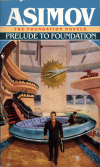
Roughly twelve thousand years have passed since the founding of the Galactic Empire. Almost the whole galaxy has been explored and populated accounting for 25 million inhabited worlds, most of which have at least 1 billion people each. Trantor is the ruling world of the Galactic Empire. It is covered completely with domed cities that go far under ground except for just 250 square kilometers which made up the Imperial palace grounds. Hari Seldon, a mathematician from Helicon, has traveled Trantor to give a presentation on his new theory called psychohistory. While psychohistory could ‘theoretically’ help predict future events, Hari is interested in it only as a theory and feels that it could never become practical.
Emperor Cleon I learns of this new theory and invites, rather forces, Hari to meet with him to discuss how it could be used to help the Imperial throne. Cleon wants Hari to use his psychohistory to ensure his success as a ruler. Hari is adamant that the theory is purely theoretical and could never be practical. After some discussion Cleon eventually lets Hari go. Somewhere after Hari leaves the palace he runs into a man named Chetter Hummin.
Hummin mentions he heard the Imperial Guard had picked Hari up and brought him to the palace and asks if there was a meeting with the Emperor. Hari admits he met with the Emperor to discuss psychohistory and how it could help the throne. Hummin gets suspicious and asks if Eto Demerzel, the Emperor’s evil right hand man, was there also. Hummin warns that the Emperor, and especially Demerzel, wouldn’t just let Hari go if he was thought to be useful. Eto Demerzel would probably be keeping a very close eye on Hari. Almost right after this a couple of thugs approach Hari and give him a hard time and say they are going to kick him off the planet immediately, although Hari was scheduled to leave the next day back to his home world of Helicon. Hari refuses and the thugs attack them but Hari and Hummin are able to fight them off and get away safely.
At this point Hummin convinces Hari to run with him and not even return to his room to gather his belongings. Hummin is convinced that the Empire is in a state of decay and will eventually fall apart. He gives several examples and eventually convinces Hari to at least try to find a practical way to make psychohistory work so it can be used to help humanity. Hummin arranges for Hari to begin his research at Streeling University. Universities on Trantor enjoy freedom from any type of Imperial interference, so that seems to be the safest place for Hari.
Hari’s contact at the university is Dors Venabili, another outworlder which is teaching history at the University. Hummin has given her the task to keep an eye on Hari and help him with is research. An incident almost claims Hari’s life and Hummin arranges for Hari and Dors to flee the University. The majority of the novel an account of Hari and Dors passing through various sections of Trantor trying to evade Eto Demerzel’s grasp.
This book comes across to me as more of an exploration of cultures than a science fiction novel. There is a lot of technology that is futuristic and explained to a certain degree, but that didn’t seem to be the main focus. Hari is attempting to track down the history of humanity and in the process encounters many ‘laws’ which seem to rule our actions. Cultural taboos are very strong and vary from culture to culture (or sector to sector in Trantor). Customs relating to appearance are also important, and vary widely. The transformation of historical events into myth is analyzed closely. The myth of the “original world” we see from the Empire Novels is still alive and strong. Hari throws himself into one dangerous situation after another in order to research these to find some way of making psychohistory practical, which in most cases Dors has to get him out of.
At about 430 pages this book is quite a bit longer than any of the Empire Novels. It didn’t seem twice as long because most of the sections are broken up rather well and the pacing is pretty quick in most places. I spent a bit more time taking notes of things I noticed which I probably wouldn’t have if this was my first reading, and had read it after Foundation and Earth according to publication date. I’ve read another review of this book that recommended reading AFTER the rest of the Foundation series because of possible spoilers. I don’t think it this novel will ruin any of the future novels, but will give you a different perspective. This is the main reason I’m reading in chronological order, having already read the series in order of publication, because I want to experience it in a different way.